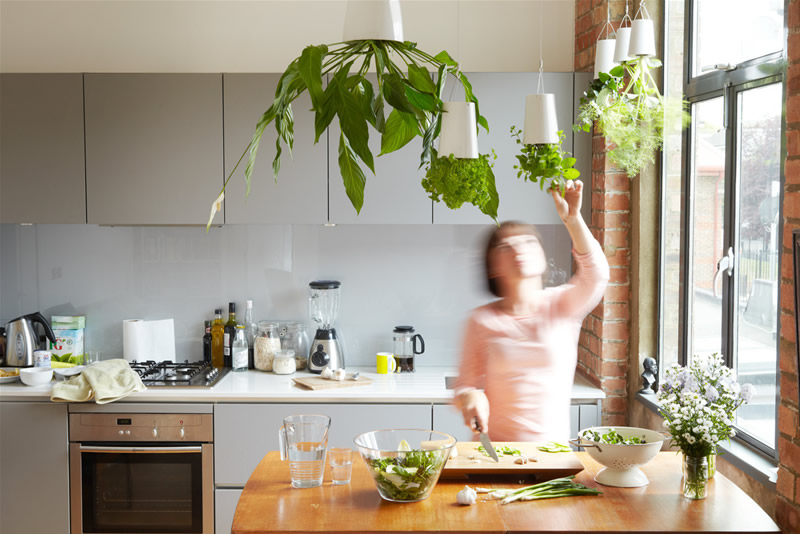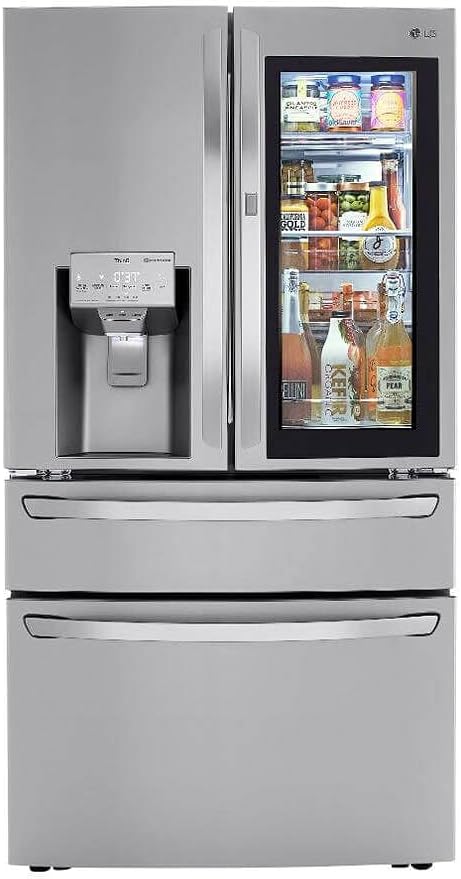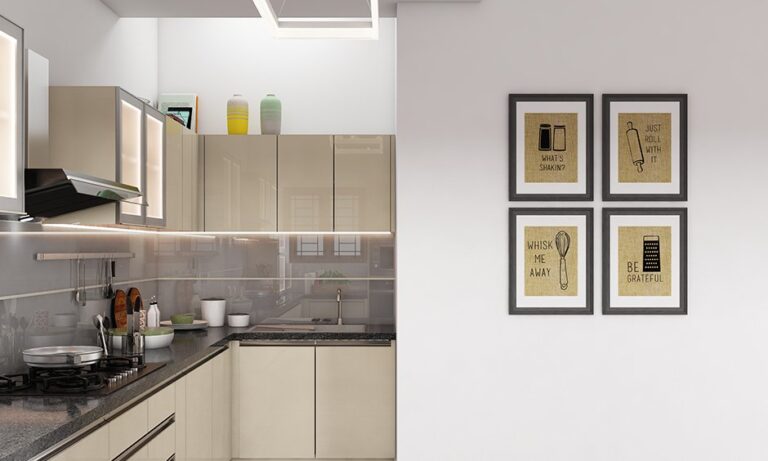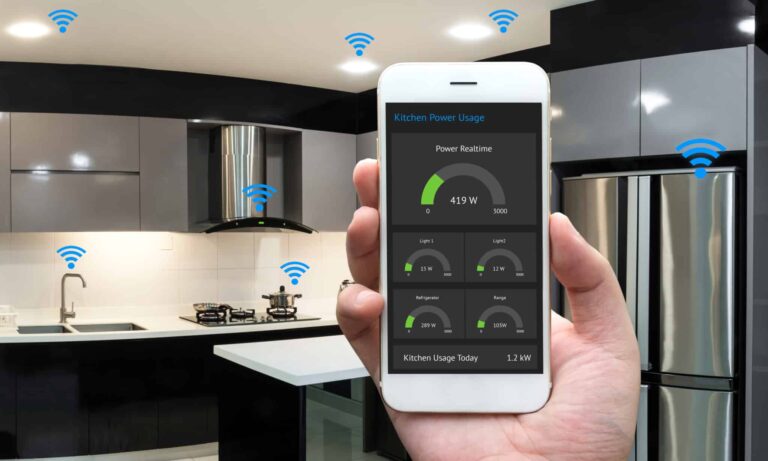As more homeowners adopt eco-conscious lifestyles, the integration of smart technology into kitchens has become a growing trend. Eco-friendly smart kitchen decor not only elevates the aesthetic appeal of the space but also helps reduce energy consumption and minimize waste. By choosing energy-saving devices and sustainable materials, you can create a stylish and efficient kitchen that is kind to the planet.
This guide will explore eco-friendly smart kitchen decor ideas, focusing on energy-saving devices that combine style and sustainability. Whether you’re designing from scratch or upgrading existing features, these ideas will help you achieve a modern, eco-friendly kitchen.
The Importance of Eco-Friendly Smart Kitchens
Designing an eco-friendly kitchen involves more than just choosing energy-efficient appliances. It’s about selecting materials, devices, and accessories that contribute to sustainability, from reducing energy use to improving water conservation. Smart technology plays a significant role by enabling homeowners to automate energy-saving routines, track resource consumption, and ensure the efficient use of water and electricity.
1. Energy-Efficient Smart Appliances
The most impactful way to reduce energy consumption in your kitchen is by investing in energy-efficient smart appliances. Modern smart appliances are not only designed to save energy, but they also boast sleek, minimalist designs that fit seamlessly into a modern kitchen.
Energy-Saving Smart Appliances:
- Smart Refrigerators: A smart refrigerator like the LG InstaView or Samsung Family Hub allows you to monitor the internal temperature, manage groceries, and receive alerts when doors are left open. These features minimize energy waste by ensuring optimal temperature control.
- Smart Ovens: An energy-efficient smart oven can be programmed to preheat only when needed and shut off automatically. The Bosch Benchmark Series offers precision cooking with energy-saving modes and can be controlled remotely to reduce energy consumption.
- Induction Cooktops: Smart induction cooktops like the ones from GE Profile use electromagnetic energy to heat cookware directly, offering faster cooking times and reduced energy use compared to traditional gas or electric stoves.
Pro Tip:
Look for appliances with the ENERGY STAR rating, a trusted certification for energy-efficient products. These appliances typically consume 10-50% less energy and water than standard models, helping you save money and reduce your carbon footprint.
2. Smart Lighting for Energy Conservation
Lighting is an essential aspect of kitchen decor, and smart lighting can drastically reduce electricity consumption while enhancing the room’s aesthetic. Smart bulbs and light strips allow you to control brightness and timing, ensuring that lights are only on when needed.
Eco-Friendly Smart Lighting Options:
- LED Smart Bulbs: Switch to LED smart bulbs like the Philips Hue or LIFX, which use up to 75% less energy than incandescent bulbs. You can control these bulbs through an app or voice assistant, set timers, or dim them to further reduce energy use.
- Motion-Sensor Lights: Install motion-sensor lighting in areas like the pantry or under-cabinet spaces. Smart lights like Sengled Motion Sensor LED bulbs turn on only when movement is detected, conserving energy.
- Solar-Powered Smart Lights: Solar-powered smart lighting options for the kitchen’s windowsill or counters add a sustainable touch. These lights charge during the day and illuminate your kitchen at night without drawing on your home’s electricity supply.
Pro Tip:
Use smart lighting schedules and motion sensors to ensure that lights are only active when someone is present. This can significantly reduce your electricity bills and lower your overall energy consumption.
3. Smart Water-Saving Faucets
Water conservation is a major aspect of creating an eco-friendly kitchen. Smart faucets with water-saving features offer precise control over water usage, helping you reduce waste and save on your water bill.
Water-Efficient Smart Faucets:
- Touchless Smart Faucets: Install touchless smart faucets like the Moen Smart Faucet or Delta VoiceIQ Faucet. These devices allow you to control water flow and temperature using voice commands or sensors, ensuring that water is used efficiently without waste.
- Flow Monitoring Devices: Pair your faucet with a smart water monitor like the Flo by Moen. This device tracks water usage and alerts you to any leaks, allowing you to address issues quickly and prevent unnecessary water waste.
- EcoFlow Aerators: Attach smart aerators to your kitchen faucets to reduce water flow while maintaining pressure. Products like the Niagara Conservation Earth Massage Aerator can help reduce water consumption by up to 30%.
Pro Tip:
Set your smart faucet to dispense a specific volume of water for tasks like filling pots or washing dishes. This ensures that you use only the necessary amount of water for each task.
4. Sustainable Smart Countertops and Flooring
When designing an eco-friendly kitchen, the materials you choose for countertops and flooring can have a significant environmental impact. Opt for sustainable, low-impact materials that complement your smart kitchen appliances and devices.
Eco-Friendly Material Options:
- Recycled Glass Countertops: Countertops made from recycled glass, like those from Vetrazzo, offer a stunning and eco-friendly alternative to traditional stone. These countertops are durable, stylish, and made from post-consumer glass.
- Bamboo Flooring: Bamboo is a rapidly renewable resource that makes an excellent option for eco-friendly kitchen flooring. Bamboo floors are highly durable and provide a sleek, modern look to complement your smart kitchen decor.
- Recycled Tile: Incorporate recycled ceramic or porcelain tiles for a unique backsplash or flooring. These tiles are made from reclaimed materials and are available in a variety of styles and colors to match your kitchen’s aesthetic.
Pro Tip:
Combine sustainable materials with smart heating systems, such as radiant floor heating, to maximize comfort while minimizing energy use.
5. Eco-Friendly Smart Trash Solutions
Smart trash solutions can help reduce waste and encourage recycling, contributing to an eco-friendly kitchen environment. These devices streamline waste disposal and offer features like odor control, automatic sorting, and composting.
Smart Waste Solutions:
- Smart Trash Cans: Devices like the Simplehuman Sensor Can feature motion sensors for touchless operation, ensuring hygiene while reducing unnecessary plastic bag use. Some models also include built-in compartments for sorting recycling and compost.
- Composters: A smart composter like the Vitamix FoodCycler or the Lomi turns food waste into nutrient-rich soil within hours, reducing the amount of waste sent to landfills and promoting sustainability in your kitchen.
- Smart Recycling Bins: Invest in smart recycling systems that track your waste and offer suggestions for reducing landfill contributions. Some bins are equipped with sensors that notify you when the bin is full or when it’s time to take out the trash.
Pro Tip:
Use smart trash bins with built-in recycling compartments to sort waste more efficiently. These bins make it easy to separate recyclables from compostable materials and minimize your kitchen’s waste footprint.
6. Solar-Powered Smart Kitchen Gadgets
Solar energy is one of the most sustainable sources of power, and incorporating solar-powered smart gadgets into your kitchen can help reduce your home’s reliance on grid electricity. These gadgets not only save energy but also add a modern, eco-friendly touch to your kitchen decor.
Solar-Powered Gadgets:
- Solar Chargers: Use a solar-powered phone charger to keep your devices charged while cooking. These chargers, like the Anker Solar Charger, harness sunlight to power your smartphone or tablet, making them perfect for eco-conscious homeowners.
- Solar-Powered Lights: Solar-powered smart lights, such as outdoor solar kitchen lighting or countertop lights, absorb sunlight during the day and provide energy-efficient illumination at night.
- Solar-Powered Appliances: For those seeking ultimate sustainability, solar-powered kitchen appliances like solar ovens or small solar refrigerators can reduce your kitchen’s energy footprint dramatically.
Pro Tip:
Position solar-powered devices near windows or on countertops where they can receive maximum sunlight throughout the day. This ensures they are fully charged and ready to use when you need them.
7. Smart Window Treatments for Energy Efficiency
Smart window treatments, such as blinds and shades, can help you regulate your kitchen’s temperature naturally, reducing your reliance on heating and cooling systems. These eco-friendly treatments add a sleek touch to your kitchen while improving energy efficiency.
Smart Window Solutions:
- Automated Blinds: Smart blinds like IKEA’s Fyrtur or Graywind Smart Shades allow you to control natural light and heat through an app or voice assistant. These shades can be programmed to close during the hottest part of the day, reducing cooling costs.
- Insulating Window Film: Install insulating window film on your kitchen windows to reduce heat gain in the summer and heat loss in the winter. Combined with smart blinds, these films can help maintain a comfortable temperature in your kitchen year-round.
- Solar-Powered Shades: For a more sustainable option, solar-powered smart shades use sunlight to power the motors, ensuring energy-efficient operation without adding to your electricity bill.
Pro Tip:
Pair smart window treatments with your smart thermostat to create energy-saving routines. For example, set your shades to automatically close when the temperature rises to reduce the load on your cooling system.
8. Smart Thermostats for Temperature Control
Maintaining an optimal kitchen temperature without wasting energy is crucial for creating an eco-friendly space. A smart thermostat can help regulate your kitchen’s heating and cooling, ensuring energy is used efficiently.
Popular Smart Thermostats:
- Nest Thermostat: Google’s Nest Thermostat learns your temperature preferences over time and adjusts automatically to save energy. It can also be controlled remotely through a smartphone app.
- Ecobee Smart Thermostat: Ecobee’s smart thermostat uses sensors to detect whether you’re home or away and adjusts the temperature accordingly. It also works with smart speakers for voice control.
Pro Tip:
Use your smart thermostat to create custom schedules, such as reducing heating during cooking hours when the oven is on, or cooling the room during hot afternoons. This ensures your kitchen stays comfortable while minimizing energy consumption.
9. Smart Kitchen Accessories for Energy Efficiency
Beyond major appliances, incorporating small energy-efficient accessories can further enhance your eco-friendly kitchen. These smart gadgets are designed to conserve resources while maintaining a sleek, modern look.
Energy-Saving Accessories:
- Smart Plugs: Install smart plugs like the TP-Link Kasa Smart Plug or Amazon Smart Plug to control the power supply to kitchen appliances and electronics. These plugs allow you to schedule on/off times, preventing devices from consuming standby power.
- Energy Monitoring Devices: Add energy monitors like the Sense Energy Monitor or Emporia Vue to track your kitchen’s energy consumption in real-time. These devices can help you identify which appliances use the most energy and optimize your usage patterns.
- Smart Kettles: A smart kettle like the iKettle allows you to boil only the amount of water you need, saving energy. These devices also offer scheduling features, so you can have hot water ready without wasting electricity.
Pro Tip:
Use smart plugs to cut off power to small appliances like toasters, microwaves, or blenders when not in use. This reduces phantom energy consumption and ensures that you’re not wasting electricity.
10. Sustainable, Eco-Friendly Kitchen Decor Materials
When selecting decor and accessories for your eco-friendly smart kitchen, prioritize sustainable and natural materials. These materials not only look beautiful but also reduce your kitchen’s environmental impact.
Eco-Friendly Decor Materials:
- Reclaimed Wood: Use reclaimed wood for shelving, countertops, or decorative accents. Recycled wood adds warmth and character to your kitchen while preventing deforestation.
- Organic Textiles: Opt for kitchen towels, curtains, and cushions made from organic cotton, bamboo, or hemp. These natural fibers are biodegradable and have a lower environmental impact compared to synthetic fabrics.
- Recycled Metal: Incorporate recycled metal fixtures and handles for a modern, industrial look. Products like stainless steel or aluminum that are recycled help conserve natural resources and energy.
Pro Tip:
Pair sustainable materials with smart, energy-efficient devices to create a harmonious blend of eco-conscious decor and modern technology. Look for products made with recycled materials that also offer energy-saving benefits.
Conclusion
Creating an eco-friendly smart kitchen is all about blending energy-saving technology with sustainable design choices. By integrating energy-efficient smart appliances, lighting solutions, water-saving devices, and eco-conscious materials, you can create a stylish, modern kitchen that minimizes environmental impact. From solar-powered gadgets to smart thermostats, every decision you make contributes to a more sustainable and energy-efficient home.
As you implement these eco-friendly smart kitchen decor ideas, you’ll not only reduce your energy consumption but also create a space that reflects your commitment to sustainability. With the right mix of technology and design, your kitchen can be both functional and environmentally friendly—a true high-tech haven for the modern eco-conscious homeowner.




